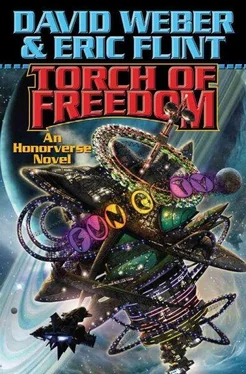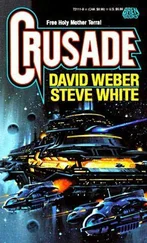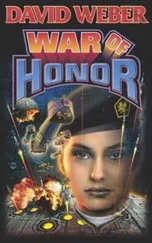That might speak well of the man, but Anton would have been a lot happier if this rogue StateSec military force—which was a very powerful one; he and Victor had been able to learn that much for sure and certain—had as its commander someone like Emile Tresca. Tresca, at one time the commandant of StateSec's prison planet, had been notorious for his viciousness and sadism. On the other hand, nobody in their right mind would have put him in charge of a frigate, much less an entire fleet.
"When will she be back?"
Victor shrugged. "No way to know for sure, but I get the distinct feeling it won't be very soon. If I'm right and she was summoned to meet with Luff, this is just one more little indication that wherever Luff's assembling that fleet of his, it's not that close to Mesa."
"But probably quite close to Torch," Anton said grimly. "Victor . . . I have to raise this again. I think we need to consider whether we should leave now, and bring the news of this threat back to Torch. You know and I know that Luff's planning to ignore the Eridani Edict."
"That's not actually certain yet," Victor said mildly. "I get the sense that Luff's resistant to the idea. But . . . yes, it's clear enough from the sort of questions Cloutier asked me. Part of the reason they're being so cautious about hiring people for any sort of high-level positions, it seems pretty obvious, is because Luff and his people think there's a good chance they'll be galactic pariahs before too long."
He got up and began walking about, just to stretch a little. The kitchen in the modest—again, to use a euphemism—apartment was too small to be able to walk more than three paces. Still, they'd been sitting for hours. Anton was tempted to get up himself and join him—except there wouldn't be room. The kitchen was excessively narrow as well as small.
"I've thought about it, Anton. But I still think it'd be a mistake—and, yes, I know I'll be cursing myself for the rest of my life if we get back and find that Torch is a cinder because everyone was caught by surprise. But, first, I don't think they will be. There's simply no way for an operation of this size to be mounted without tripping some alarm wires somewhere. You have just as high an opinion of Rozsak's chief of intelligence as I do. I don't think there's much chance that Jiri Watanapongse hasn't figured out what's happening yet. Neither do you."
He paused in his pacing. "And that's really all that's involved, isn't it? Just bringing a warning? It's not as if either you or I would be any help on Torch, even if we got back in time to meet the attack. That'll be a naval brawl, pure and simple. And if neither Maya nor Erewhon comes to Torch's aid"—here, his expression got very bleak—"then about all that'll be left to do is wreak whatever vengeance we can."
He started pacing again. "On the other hand, if we stay here, we have a real chance of making a lot of progress on any number of fronts. Just for starters . . ."
Anton glanced at the clock on the wall. They'd been at it for almost three hours, and it was now clear they wouldn't be ending any time soon.
"Sit down, Victor," he said. "Give someone else a chance to stretch a little."
"Yeah," said Yana. "Me first."
September, 1921
"Sit down, Lajos," Jack McBryde invited. "Take a load off. How does a cup of coffee sound?"
"Coffee sounds good," Lajos Irvine replied. He smiled as he said it, yet there was a slight—very slight, perhaps, but undeniable—edge to his response, and McBryde reminded himself not to grimace.
Irvine wore the traditional gray smock of a general laborer genetic slave. The smock's shoulder carried the stylized image of a cargo shuttle, which marked its wearer as a ground crewman at the Green Pines shuttle port, and the three chevrons above the shuttle marked him as a senior supervisor—in effect, a trustee. Irvine had the heavyset, muscular build to go with that smock, and if he'd cared to open his mouth and display it, his tongue carried the barcode of a slave, as well. In fact, physically, he was a slave—or, at least, clearly the product of a slave-bred genotype. Except, of course, for the fact that unlike real genetic slaves, he had the enhanced lifespan of a gamma line.
It was a fact which the Alignment's star lines seldom discussed, even among themselves, that genetically, they were much more closely related to Manpower's slaves than they were to the vast majority of humanity. For centuries, the slave lines had been the laboratories of the Long-Range Planning Board—the place where newly designed traits could be field-tested, tried out, and then either culled or incorporated into those same star lines and conserved. The LRPB had been careful to work from far behind the scenes, even (or, perhaps, especially) within the Manpower hierarchy, but it's access to Manpower's breeding programs had always been a major factor in its successes.
One consequence of that was that even the Alignment's alpha and beta lines shared a whole host of genetic markers with Manpower's slaves. None of those slaves had ever received the entire package of one of the star lines, of course, just as none of them had received prolong, yet there was an undeniably close relationship between them.
That relationship helped the Alignment's penetration of the slave community as a whole, too. Irvine was an example of that, given how little modification his basic genotype had required to suit him for his role. There were never as many deep-penetration agents of his type as Alignment Security might have wished, but that was the result of a conscious policy decision, not of any inherent limitation on the number of potential agents. There'd been the occasional discussion of increasing the numbers of agents like Lajos, especially as the Audubon Ballroom had grown in sophistication and audacity. There were those (and he knew Steven Lathorous was one of them) who believed the Ballroom's capabilities were reaching the point of genuinely threatening to uncover the truth of the Alignment's existence. The people who felt that way were most likely to press for the creation of additional deep-penetrators, yet however cogent their arguments might be, the considerations of the Alignment's "onion strategy" continued to preclude the possibility. The Alignment had always relied on misdirection, stealth—on not being noticed in the first place, rather than building the sort of rockhard firewalls which were likely to attract the very attention it sought so assiduously to avoid.
Ironically, the limited numbers of available deep-penetration agents was part of what had made them so successful for so long. Not even Manpower knew that some of its "slaves" were nothing of the sort. That had made life hard for quite a few of Irvine's predecessors and fellows. In fact, the conditions of their "slavery" had cost more than one of them his life along the way, despite everything the Alignment's penetration of Manpower's bureaucracy had been able to do to protect them. But it also meant their security was absolute. No one outside their controls and handlers even dreamed of their existence, and keeping things that way meant holding their total numbers down to something manageable. The Ballroom was aware of the dangers of counter-penetration of course. There'd always been some of that, just as there would always be human beings who could be bribed—or coerced by terror and threats against those they loved—to spy upon their fellows. At least some of the Alignment's agents had been identified as exactly that, over the years, and paid the price the Ballroom exacted from traitors. Yet all of them had died without anyone ever realizing who—and what—they actually were.
Which, to be honest, was one of the reasons McBryde and Lathorous found Irvine's constant efforts to escape his current assignment particularly irritating. McBryde could sympathize with the fact that living a slave's life wasn't going to be especially pleasant under any circumstances, but at least Irvine's present duties were downright cushy compared to what some of his fellows had suffered—or to what they were enduring at this very moment, for that matter.
Читать дальше












